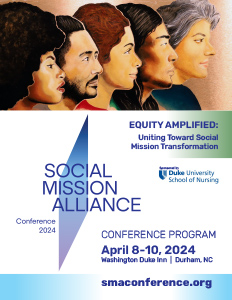Concurrent Breakout Sessions
Uniting Forces in Interprofessional Collaboration for Legislative Advocacy and Addressing Healthcare Disparities for the Medically Complex: Q&A and Discussion
Monday, April 8, 2024
11:15 AM - 11:20 AM East Coast USA Time
Location: Ambassador McGhee/Allen

Alita-Geri K. Carter, MSN, RN, CPNP-PC (she/her/hers)
Chief Consultant and Founder
Qualequity Access, LLC.
Salisbury University
Bowie, Maryland, United States
Presenter(s)
Proposal: According to the Maryland State Department of Education, data from 2021-2022 showed that 12% of students had a disability (2023). Prince George's County Public Schools reported having 12.8% (13,582) of its students with a disability (Maryland State Department of Education, 2023). According to the American Academy of Pediatrics, health equity for children and youth with special healthcare needs requires a multisector approach, which includes community development (Houtrow et al., 2022). The journey of House Bill 5 in the state of Maryland is groundbreaking legislation aiming to revolutionize public playgrounds to increase accessibility by providing communication boards. Communication boards are assistive or augmentative communication devices that utilize photos, symbols, or illustrations to support communication (Stanborough, 2020). The bill proposes using "open space funding" to integrate communication boards on playgrounds. In the past, the draft legislation was reported to primarily benefit non-verbal children. Despite being sponsored twice, the bill has yet to receive a vote. Enhancing community development through initiatives like House Bill 5, which emphasizes accessible playgrounds and communication boards, presents a unique opportunity to bridge gaps in health equity by providing inclusive spaces that cater to the diverse needs of children and youth with special healthcare requirements.
The presenter, armed with passion and determination, shares her involvement in supporting HB-5. The most recent general session highlighted the potential of communication boards as tools to aid non-verbal children, enforcing a mandatory timeline for completion. During the 2023 legislative session, the presenter drafted a compelling letter of support, backed by evidence from authoritative sources. The sponsor withdrew the draft bill and it did not receive a vote (Maryland General Assembly, 2023).
The presenter kept momentum despite the bill being withdrawn in 2023 without a vote by the sponsoring delegate. She delved into press releases, scrutinized state-level and jurisdiction-level data, and formulated a strategic plan for coalition building among stakeholders willing to champion the cause. Significant victories were securing the support of an additional delegate as a sponsor, amplifying the bill's potential impact, and successfully partnering with the Maryland Speech Language and Hearing Association.
This presentation will give attendees insights into the intricate connections between legislation, data, interprofessional collaboration, and advocacy. It serves as a testament to the power of perseverance, strategic planning, and individuals' impact on shaping policies that address critical societal needs.
The presenter, armed with passion and determination, shares her involvement in supporting HB-5. The most recent general session highlighted the potential of communication boards as tools to aid non-verbal children, enforcing a mandatory timeline for completion. During the 2023 legislative session, the presenter drafted a compelling letter of support, backed by evidence from authoritative sources. The sponsor withdrew the draft bill and it did not receive a vote (Maryland General Assembly, 2023).
The presenter kept momentum despite the bill being withdrawn in 2023 without a vote by the sponsoring delegate. She delved into press releases, scrutinized state-level and jurisdiction-level data, and formulated a strategic plan for coalition building among stakeholders willing to champion the cause. Significant victories were securing the support of an additional delegate as a sponsor, amplifying the bill's potential impact, and successfully partnering with the Maryland Speech Language and Hearing Association.
This presentation will give attendees insights into the intricate connections between legislation, data, interprofessional collaboration, and advocacy. It serves as a testament to the power of perseverance, strategic planning, and individuals' impact on shaping policies that address critical societal needs.
Learning Objectives:
- Upon completion, participants will be able to articulate the significance of the utilization of data in the context of healthcare policy planning.
- Upon completion, attendees will be able to define elements of multi-sector approach to health equity for children and youth with special healthcare needs, as per the American Academy of Pediatrics
- Upon completion, participants will demonstrate their ability to apply knowledge of available resources in order to create an inventory of legislation, enabling them to identify potential opportunities for legislative advocacy.

